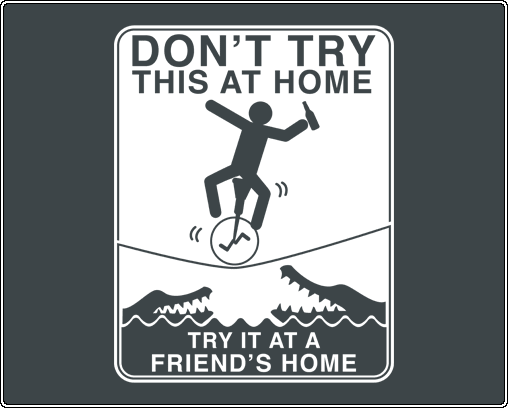Don't Try This At Home: On Portrayal vs. Endorsement
 As I alluded to in a previous post, I have a huge pet peeve about readers who can't-- or won't-- separate the views of an unreliable first-person narrator from the views or intention of the author (for example, calling a story sexist because the narrator is a huge chauvinist, even though other facts in the narrative show that he's clearly wrong). In the same vein, many people--both authors and readers-- seem to conflate portraying something in a story with endorsing that opinion or behaviour.
As I alluded to in a previous post, I have a huge pet peeve about readers who can't-- or won't-- separate the views of an unreliable first-person narrator from the views or intention of the author (for example, calling a story sexist because the narrator is a huge chauvinist, even though other facts in the narrative show that he's clearly wrong). In the same vein, many people--both authors and readers-- seem to conflate portraying something in a story with endorsing that opinion or behaviour.Characters-- at least those who aren't a spectacular Mary Sue or spectacularly dull-- make mistakes. This means your character will do and say stuff that makes the reader gasp or cringe or facepalm, with the understanding that the character is definitely wrong (even if no one immediately calls them out on the problem due to the nature of the story or environment or characters around them). You are telling a story about a set of unique and flawed characters, not writing a guide to etiquette or morality.
Furthermore, whole societies have systemic problems which will be reflected in the characters' behaviour. This can be particularly jarring in historical fiction, because the problems of the era are often different than those of our own society, to which we're somewhat desensitised. Given that environment, even the sympathetic characters are likely to express views which will be repellent to modern readers. The characters in the Forgotten Gods series toss ethnic and sectarian slurs around constantly, as well as doing any number of questionable things in the pursuit of doing what they think is right. In real life, Michael and I have banned people from our respective homes for saying stuff like that, and we assume our readers will see the negative impact characters' bigoted views, and take it as social criticism rather than a suggestion for how to make small talk.
Published on June 17, 2013 02:18
No comments have been added yet.



